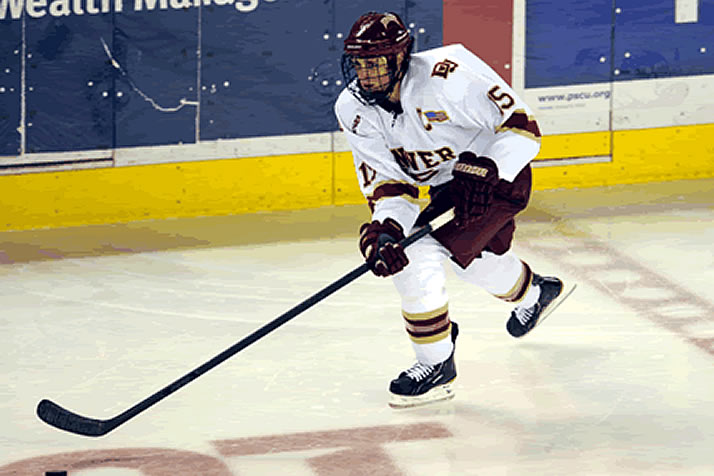


In Developing Story, a regular feature on collegehockeyinc.com, we highlight current college hockey players who have developed their skills during their careers – either on the ice or off – and in turn made a bigger impact on their team’s success.
Drew Shore is one of college hockey’s top all-around players, a do-it-all type who can shoot and pass the puck, play in all situations and skate with opposing teams’ top lines.
Given that – and his reputation as one of the hardest workers on the DU team – perhaps it’s not surprising that the junior can’t isolate one aspect of his game that has improved most in his time on campus.
“It’s been a little bit of everything,” he said, taking a break from preparations to host Minnesota this weekend. “I’ve always taken pride in my offensive ability, but I’ve definitely improved there. At the same time I’ve become more responsible defensively, which has been important because we’re often matched up against the top players on the other team.”
Shore was a heralded recruit – the No. 5 forward in the country in his class, by one ranking – and impressed as a freshman, recording 19 points. The alumnus of the USA Hockey National Team Development Program picked up some good role models that year, as well.
“In my freshman year, I watched how Joe Colborne and Rhett Rakhshani would grab pucks and shoot before and after practice,” he said. “I hopped in with them about halfway through my freshman year and that has really helped.”
An improved shot helped Shore as his coaches encouraged him to adopt more of a shooters’ mentality, putting pucks on net rather than looking for a perfect pass. After scoring 5 goals as a freshman he netted 23 as a sophomore. He’s on the verge of matching his 23-23—46 totals from last year already, before we’ve even hit mid-February.
One of the Pioneers’ co-captains, Shore has also worked hard off the ice to add strength, something he identified as a priority early on.
“It’s a big jump playing in the WCHA as a 19-year-old,” he said. “The defensemen are big and strong, and you really need to be strong all-around or you’ll get knocked off the puck.”
Summer conditioning has been key in adding strength, but Shore notes that it’s really a year-round effort, one that is helped by the college schedule.
“If I was playing three or four games a week, it would be awfully tough to get that work in off the ice,” he said. “That’s part of the appeal of college hockey. You have two tough games each weekend but you also have time to practice and do the off-ice work that you need.”